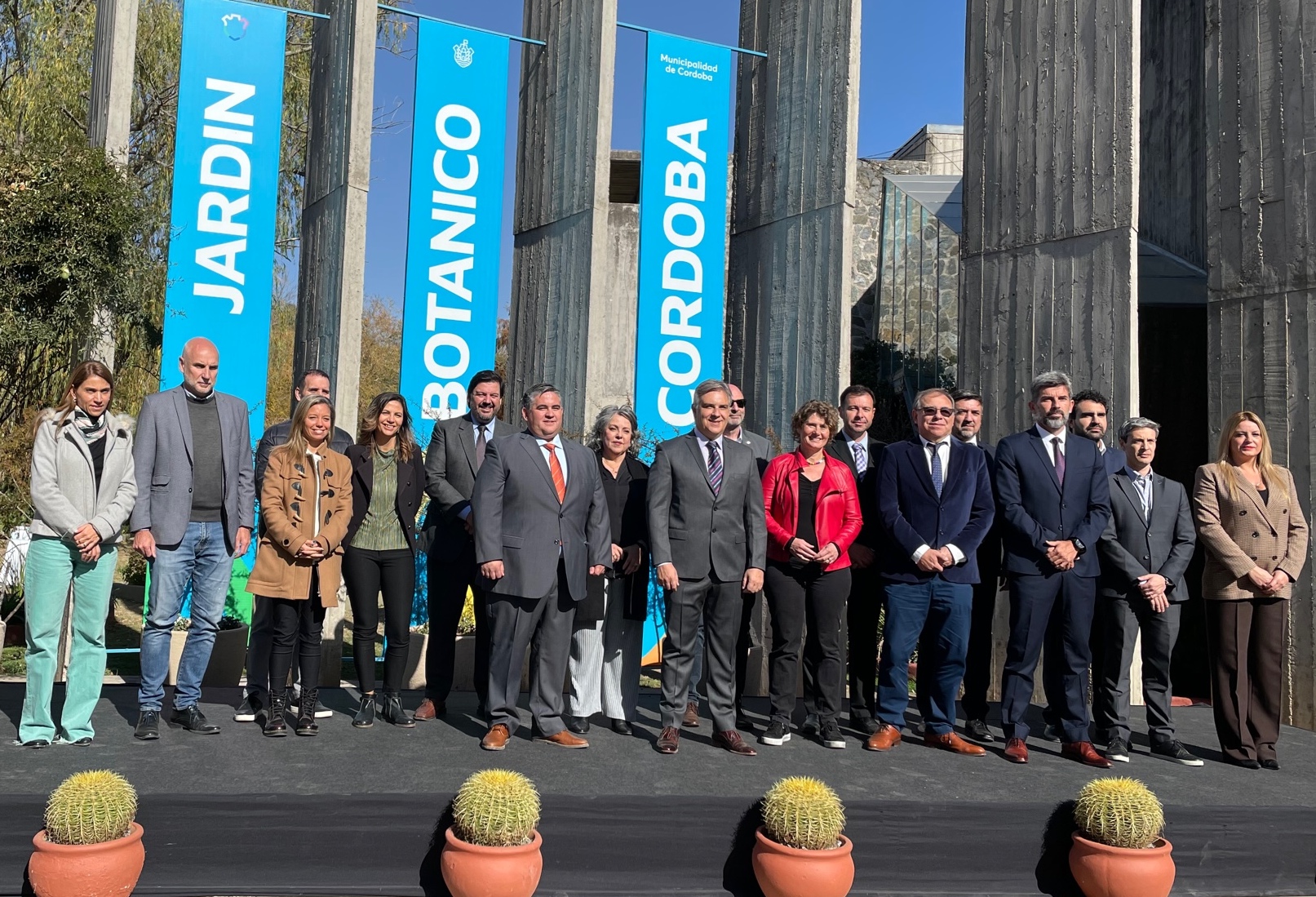
06.2022 Argentina – Cordoba goes circular
Zero-waste city – the concept has long since arrived in the Global South. This is also the case in the city of Cordoba, the capital of the Cordoba region in Argentina. It has set out to implement the circular economy. For the second time, an international congress called Cumbre Mundial de Economia Circular has been held there to show the public what is behind the term Circular Economy. This is a great approach, it has also received the necessary public response, because the awakening is moving forward: in addition to a business cluster, an Internet platform, learning formats and university cooperation, everyone in the city is called upon to make their contribution. And this is also demonstrated at a small trade fair that is very reminiscent of German eco-fair formats. In addition to a large main podium with internationally known speakers, there are also small stages where companies that have long since started to implement the Circular Economy give presentations: Solar-Tech companies, a vehicle show with cars and a hall where we meet all forms of two-wheelers – with and without electric motors. In another hall we encounter lots of eco-products, ranging from efficient microorganisms for soil remediation to plastic recyclers. The only thing we don’t find is a reference to a road map or a strategy for implementing the Circular Economy.
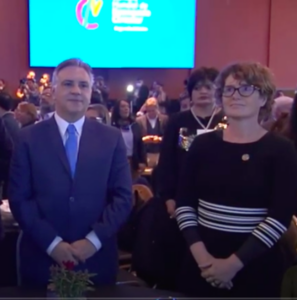
Intendente Martin Llaryola and Eveline Lemke during the singing of the Argentine National Anthem
Because the departure into the Circular Economy should get a chance to establish itself here sustainably, Peter Heck and I were invited by the city of Cordoba. I have been regularly in Argentina for years and therefore the city of Cordoba gives me hope, because the question of whether the awakening will bear and have political assertiveness comes up immediately. Carlos Villar from HINS Energia is also waiting for us. He is one of the main drivers in the solar business locally. And he is an old acquaintance, knows the environmental campus and Rhineland-Palatinate. He is the persistent fighter on site who wants to anchor the topic of Circular Economy permanently and knows which political forces are at work on site. Carlos Villar is one of those who create the space for shaping the future.
And so, we embark on a journey that raises these difficult questions right at the beginning: Is it legitimate to offer aid to countries in the Global South? Or is aid quickly misunderstood because industrial exploitation, as the economic model of the Global North since colonization, is causing the very climate damage we are trying to repair today? For us, it is neither the role of the helper nor the old idea of industry that brings us here. But the challenge to live THE BEST OF TWO WORLDS, that’s what we want to do here.
And then there is the question of whether the Circular Economy is the better economy? We are convinced that it is, but the Circular Economy also has its pitfalls and requires a good understanding in order not to repeat old rebound mistakes. And the Circular Economy is by no means just about waste disposal and closing open landfills. Because that’s how it’s often presented here; after all, the landfills here also catch the eye. Hundreds of open landfills litter the landscape and pose environmental hazards.
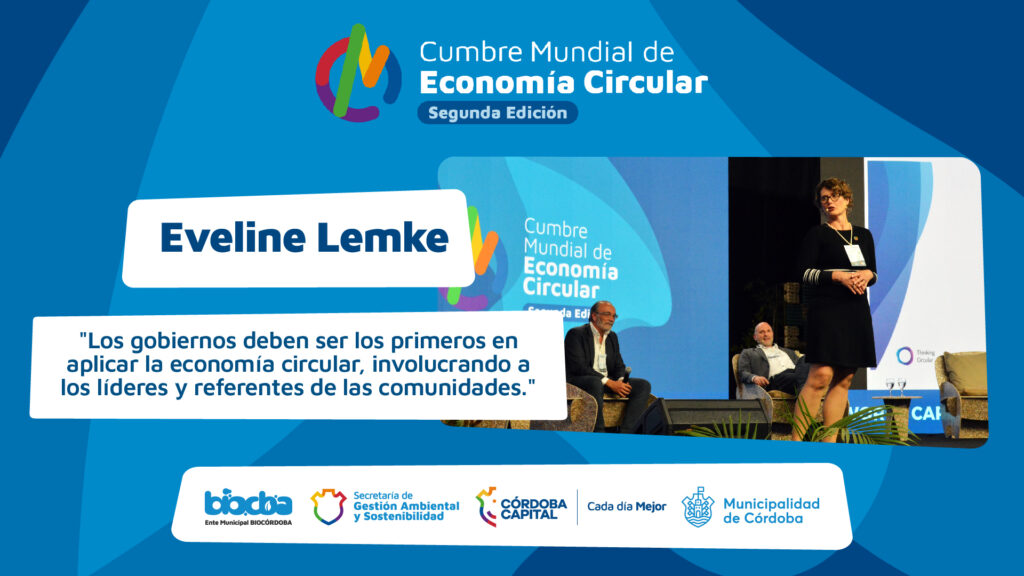
Eveline Lemke on stage with Minister Fabián Lopez and Prof. Dr. Peter Heck
The concept of the Circular Economy, which is based on the natural design of the planet and is not essentially about making money by recycling, is not always fully understood or even translated. And it has so many facets that a mediation in a South American country with only 2 days seems unthinkable.
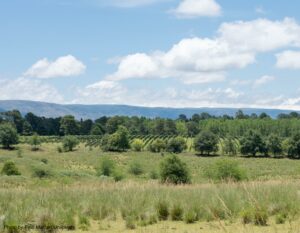
Calamuchita Argentina
Already the flight over the country of Buenos Aires, the 17 million metropolis and main city, where almost one third of the Argentine population lives, shows how the understanding of circularity is. From the air we can clearly see the parcels of arable land. They are divided into large areas that are intensively used for industrial purposes. Cows and cattle stand here already in the stable and do not run freely, as one imagines gladly transfigured. There are hardly any trees between the huge fields, no hedges, no marginal strips. Nothing looks like biodiversity here. What cooperation is there for the development of organic farming? Perhaps the drought of recent years will move the issue. Land planning or strategies for water retention do not exist either, even though all the roofs here are equipped with water tanks that use thermal energy to heat water. Land planning is not a political instrument here, nor is organic farming anchored or biomass use for local energy consumption a concept.
So where can we start? Peter Heck can forge scientific collaborations here so that the foundation of knowledge can broaden and the collaborations between Argentina and Germany can also survive political changes. IFAS (Link?) initiatives have seen Chinese, Japanese, Mexican, Brazilian and hopefully soon Argentine universities working together on the same issues, which are then solved differently on the ground. Its annual International Circular Economy Week is a format that has been in place for more than a decade, dedicated to the challenges of bringing projects to application. Why not invite Minister Fabian Lopez and a delegation? Done – done.
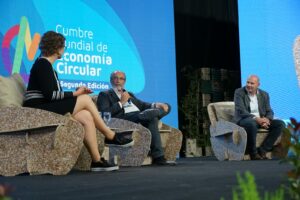
Discussion with Eveline Lemke, Minster Fabián López and Prof. Dr. Peter Heck
But there is progress in Cordoba, also here there are forward thinkers and networkers who have penetrated the topic and would like to communicate it in a way that it meets the demands of a real green development. They want to network and get started. The mood of optimism, especially after the Corona lockdowns, is unmistakable.
We are already asking ourselves on the journey how we can convey that old policy instruments, which are used here with pleasure and do not bring about change, can be replaced? For example, Argentina still owns its own oil and gas reserves and still subsidizes them abundantly. Divestment as a strategy and a way of dealing with the potential losers of the transformation? Is that on the agenda? As we learn at our first stop of the trip in Buenos Aires from the Deputy Minister of Environment, Sergio Federovsky, this is not a topic of discussion. Circular economy is essentially associated by the national government with the closing of wild landfills and landfill aftercare. Recycling is sporadic, and the circularity factor for Argentina or its regions is unknown. Moreover, projects are too often developed with taxpayers’ money and they always die when there is a change of government and they were not economically thought out. And then there is also a lack of strategy or roadmap. Will we be able to talk about how the Circular Economy should actually go without government support and what the transformation might look like for policy instruments? In any case, it won’t succeed with the Deputy Minister of Environment, because in 1.5 years there will be elections and there the topic of Circular Economy won’t be in the center of attention.
This is completely different in Cordoba and gives hope that much is possible at the local level. The event in Cordoba was medialized with the national greats of TV anchoring, national media representatives were present and they also facilitated a huge coverage. And this is also important, because the projects of transformation are still almost invisible in Argentina.
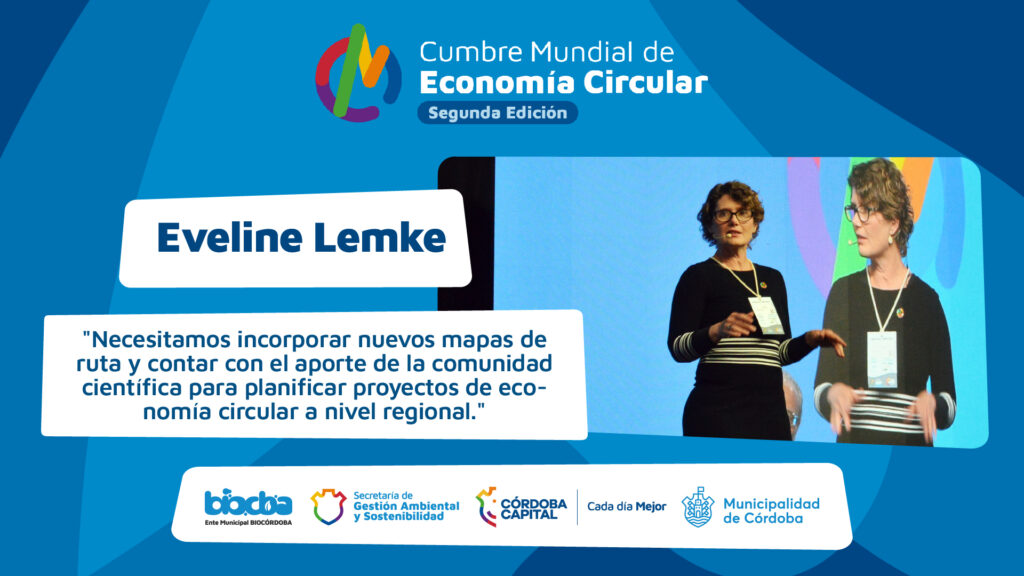
If you fly over the country, you will see neither wind turbines nor shimmering solar roofs, yet the country has everything it needs for a flourishing bioeconomy: Water from the Andes, which flows out of the pipes in Cordoba for very little money, biomass in rich fields – the question arises as to how the full potential of the Circular Economy can unfold here.
This is urgently needed, because poverty and inflation have been massive challenges for Argentina for years, and now they are joined by the tasks of climate protection and adaptation to climate change.
On the occasion of the 2nd International CUMBRE MUDIAL on the Circular Economy in Cordoba, I was able to experience the impulse power with which the topic is being tackled here. Of course, another state election campaign is coming up soon. So, we are seeing how the parties are positioning themselves over a dispute that reflects the great divide in society: The Papelleros, a group of cooperatives that collect waste paper and are subsidized for it by the national government, want to be let in. There is no place for them at the fair. From a European point of view, this is difficult to understand. And why, of all people, do the stakeholders who actually take waste into their hands have to stay outside? What’s more, the circular economy is also supposed to solve social conflicts, and it can, for example by involving local players in the new value chains.
But here the clocks tick differently, and all that remains is for us to grasp these things, to see how political disputes about social minorities play out. Political and invisible rules do not reveal themselves easily or immediately.
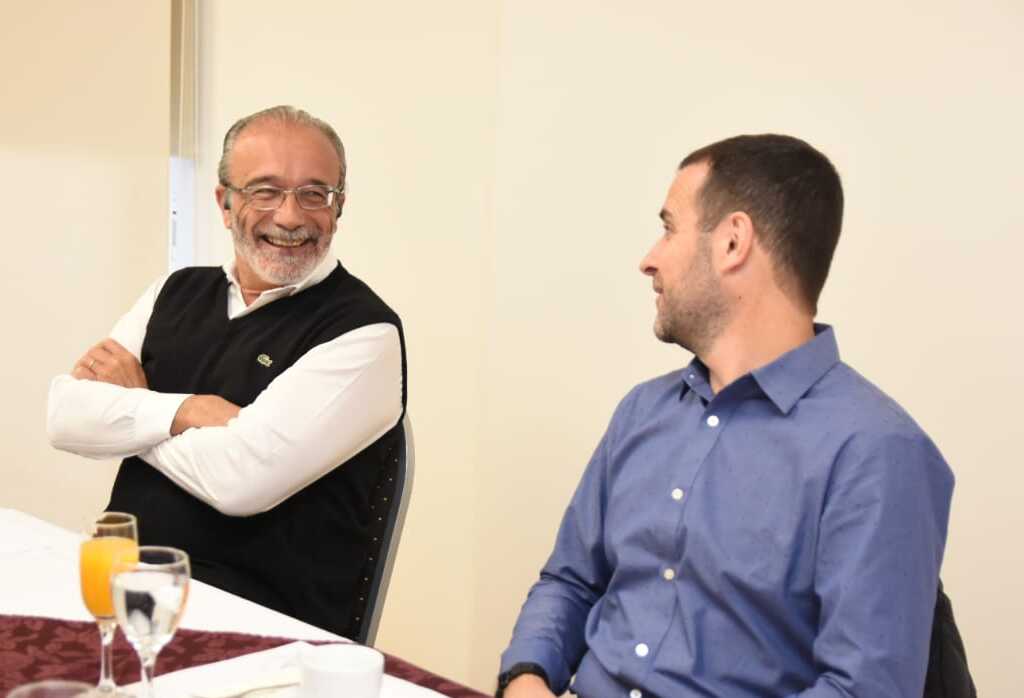
Minister Fabián López and Carlos Villar, Hins
Therefore, we simply want to remain concrete during the short visit. To do this, we can talk to the Minister Fabian Lopez and his Secretary of State Sergio Mansur, who are responsible for government services. The ministry also commissions infrastructure, for example for wastewater disposal, which is a good example of the Circular Economy. The conversation is fruitful, we can discuss concrete projects and gain a common understanding of the Circular Economy. It is obvious to immediately plan the next visit for a delegation of people from Cordoba to participate in the International Circular Economy Week in Birkenfeld and to strengthen the scientific links.
Things also get concrete at the end of our appointments. We visit a school for the Circular Economy, where pupils and students learn how waste separation works and that material can be reused. The training is intended to help local cooperatives to build up their own collection structures and to establish small collection and recycling structures. Traditionally, such structures have existed for a long time, but they have not contractually agreed on cooperations for the delivery of their material with buyers. This is an area where work can and must be done. In addition, an understanding of the cradle-to-cradle principle is needed in these places of learning. Otherwise, the pitfall of downcycling is pre-programmed here as well, creating frustration and reducing trust in credibility. Well thought out is not always well done. But as is well known, schools serve for learning, a RETHINK must also remain permitted here, the place where this is to happen has already been created precisely for this, which is a good prerequisite.
At the end of the trip, one thing is certain: if our Argentine friends want to use the best of the two worlds for their ZERO WASTE strategy, we are happy to be there for them and welcome them to Rhineland-Palatinate as well.
You find the video, including my speech, here.
Coverage in the national press (in Spanish):
Perfil: “The role of citizens is key to the future of the Cricular Economy”
Alfil: Second World Summit on the Circular Economy opens
LaVoz: The second edition of the Circular Economy Summit has started live
El Diario: IN CORDOBA – THE WORLD Circular Economy Summit
El Economista: The World Summit of the Circular Economy comes to Cordoba
La Nacion: Circular Economy – what it is and how to apply this model in everyday life.